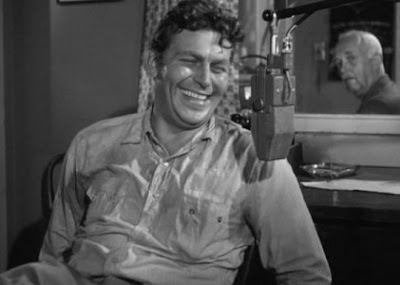A Face in the Crowd
seen on TV @ TCM
5.31.12
Does it really make a difference to you if a celebrity endorses a product? This being America, it's entirely possible that we are subconsciously influenced by them on some level, whether we admit it or not. When I was younger, I wore a Kangol hat because I wanted to look like Run DMC (and I did kinda look like DMC, glasses and all).
I understand why it matters to us. Celebrities are popular, glamorous and wealthy. We see them on a stage or on a screen and we want to be like them in some way, to have some of their glitter rub off on us. When we start doing what they tell us, however, that's when it can get a little dicey. It can be so easy to be led around by a certain someone with the right amount of charisma and charm - and not just by entertainment celebrities, either. When I saw Barack Obama speak live during his presidential campaign, I remember steeling myself, trying my best to remain as objective and open-minded as possible and to not get caught up in the fervor of the crowd. I knew I would vote for him anyway, but I still wanted to really hear what he was saying and not take it for granted just because I wanted him to win. It was tough, though.
The blending of politics and entertainment is certainly not a recent one, but it's more popular than ever now. My old roommate Max is a big Stephen Colbert fan, so much so that one weekend, back when we were still living together, he and his teenage daughter (also a fan) took a trip to New York to see a live taping of his show. Every now and then I'd watch Colbert with Max. Colbert's alright, I guess, though he didn't leave that big an impression on me. I suppose I like Jon Stewart a little better. (Max would watch him too.)
I remember how involved Oprah Winfrey was in the Obama presidential campaign. There was a front-page newspaper photo - might've been from the New York Daily News - of Oprah and Obama, around the time he got the nomination from the Democratic party, with the headline, "Kingmaker." That front page gave me pause: to think that a Hollywood celebrity could be that influential...?
Oprah in particular is an excellent example of someone who is much, much more than a celebrity; she's a brand name. For instance, when her magazine O came out, I remember thinking how narcissistic it seems to have a magazine devoted to yourself - and now she's got her own network on top of everything else. Don't get me wrong, she's done a lot of good and I don't really have anything against her per se - a successful black woman in America is absolutely something to take pride in - but sometimes it does seem as if some of her fans take everything she says as the gospel truth.
A Face in the Crowd was made three years before the Kennedy-versus-Nixon presidential campaign of 1960, during a time when television was still a relatively new medium, with its true potential only beginning to be discovered, and it's remarkable how it predicts the course the course the 1960 campaign would take: Kennedy, the photogenic, TV-friendly candidate defeating the swarthier Nixon, who many thought was the better debater of the two. But then, they probably didn't see him on TV.
Orson Welles' Charles Foster Kane used his newspapers to spread his influence, but he at least was a highly educated man who more or less had one foot already in the political sphere. With Andy Griffith's Lonesome Rhodes, here's a film character who conquers a medium despite not having much more to say than easy platitudes and selling his image as much as, if not more, than his message. We've become so used to it now, in this reality-TV age where any idiot can grab their fifteen minutes of fame, but Face predicts all of that, to such an accurate degree it's scary.
Face was written by Budd Schulberg, author of the infamous Hollywood insider novel What Makes Sammy Run?, and like Face director Elia Kazan, was an informant to Congress during the Red Scare of the 1950s. It always disturbs me whenever I read about stuff like this. I mean, guys like Schulberg and Kazan were rats, but at the same time, they made movies like this. It's difficult to accept the bad as well as the good about a creative person, but what else can you do?





This is one of many movies which prove that the '50s wasn't the naive, simplistic sentimental mush mess it's often portrayed as (usually by people who haven't spent much time examining its artifacts). There's hardly a scary idea in this great movie that isn't at least as true today as when the film was made.
ReplyDeleteSometimes it seems as if other film bloggers - especially classic film bloggers - tend to look at the past with rose-colored glasses. They tend to be fairly young, and while I'm not saying they don't have a sense of history, I think it's easy to believe that everything was better Back in the Day.
ReplyDeleteSpeaking of classic film bloggers, I hope you don't mind if I drop in a plug for my own blog, where I'm reviewing every MGM feature film from 1924 through 1960 which still exists: http://anmgmblog.blogspot.com/
ReplyDeleteI forgot you had a film blog too. I'll head over there now.
ReplyDelete